Much like the train set you were given when you were young, which had perhaps a simple oval of track and a few carriages, the London Overground concept has been faithful to the original marketing of ‘London’s new train set’, with the addition of new track and plenty of new trains.
An amalgam of the old Silverlink Metro and virtually empty London Underground East London Line networks - neither of which were being exploited for their full potential - the Overground’s success has matched the capital’s economic success story.
In ten years, the extension of the East London Line north to Dalston and Highbury and further south onto existing Southern Region lines has turned into a much bigger project that has aimed to better connect (and indeed market) some relatively disparate and unloved parts of the capital’s rail network.
It was factors such as London Overground that ensured a successful bid for the London 2012 Olympic Games, and LO formed part of the highly regarded public transport operation that duly supported the Games.
The success of the Overground has been due in no small part to generous and consistent funding for its development. But passengers have responded with a rapid and grateful return on that investment - passenger numbers on the various lines have risen by 400% since 2007, and the network is one of the most reliable in the UK.
To help meet the growth in numbers, a programme is under way to introduce five-car trains across the North, East and West London Lines.
And on May 31, the Overground map will get 25% bigger, with the addition of the West Anglia routes from Liverpool Street to Cheshunt, Chingford and Enfield Town.
On the same day, Liverpool Street-Shenfield Metro trains will also join the Transport for London network, in preparation for the beginning of Crossrail services in 2018. Although this will be managed under a separate concession, ownership will be under MTR (which part-owns, with Arriva Trains UK, the current LOROL-operated concession for London Overground).
All of this must surely herald considerable changes within LOROL?
Managing Director Peter Austin insists that change is constant, and part of the everyday business. Now LOROL is delivering one more big change before its concession is up.
“The West Anglia, although we’re well versed in change programmes, is going to be one of the biggest that we’ve done,” he says.
It involves 300 train services and some 31 additional trains - LOROL will inherit a mix of BR-vintage rolling stock, in the form of 17 Class 315s dating from 1980 and 14 slightly newer Class 317s.
One of the major successes of the current concession has been new rolling stock, including the £88 million order for the 57-strong Class 378 fleet introduced progressively from 2009 onwards. So is Austin concerned that the introduction of older rolling stock may affect reliability?
“A lot of the rolling stock is going through existing C6 examinations anyway, which will help address some of the problems they’ve been having,” he says. “We are doing some minor work on reliability, and Abellio Greater Anglia has been helping us with that - doors and batteries on the ‘317s’.”
While the ‘315s’ are slightly older, Austin says that they are the more reliable of the two fleets, and more suited to the work they will be doing.
“Some of the 317s have been out of service and in storage for a while, and AGA is helping shake those down and get some service mileage,” he says.
Bringing the rolling stock up to an approximation of new train LO standards is the next task.
“The stock is going to get a slight refresh - moquette seat covers and orange poles. At the same time, AGA branding will be neutralised.”
In addition, the existing fleet currently contains eight two-car Class 172 diesel multiple units used solely on the Gospel Oak-Barking line (a diesel ‘island’ in the capital). Eventually, the yet-to-be-placed order for 39 new electric multiple units (for which the procurement process is under way) will release the ‘172s’ for use by grateful operators elsewhere, possibly even another company owned by Arriva UK Trains, Chiltern Railways.
Does Austin have any concerns about the rolling stock he will be inheriting? After all, he’ll need to manage the transition between current rolling stock and new stock, when it is expected to arrive in 2018.
“I think there have been some lessons learned from when we first took over in 2007,” he says. “The Silverlink franchise was being managed on a low-cost basis. Perhaps the mistake that everybody made at the time was the promise that ‘London’s getting a new railway’.” (Well, it wasn’t entirely new, but from personal recollection and commuting experience, it was a radical improvement on what had existed before.)
“But, of course, the new trains didn’t come until two years later. We’re trying to be clear in the messaging about what we can deliver. It won’t be revolution, but I’m pretty confident we can make some major inroads in the 18 months between now and the end of the concession, bringing the West Anglia up to the same standards as the rest of the Overgound.”
While new electric rolling stock for Gospel Oak-Barking and the West Anglia services is on the way, with TfL responsible for its procurement (and awarding of the post-2016 concession), it remains to be seen whether LOROL itself will introduce it.
Says Austin: “Gospel Oak-Barking has been - is - a huge success. We’ve gone from Class 150s two trains an hour, to Class 172s four trains an hour.”
However, that success is tempered by the lack of suitable rolling stock, wires or no wires: “Unfortunately, until the line is electrified and we get the new fleet, there is little we can do. We have looked at getting an additional fifth path, but it does not exist.”
Austin adds that there is neither additional rolling stock nor path available. “We are sweating the assets as much as we can. We put additional trains in the peak. But occasionally they do get cancelled, as we don’t have as much flexibility as we’d like due to maintenance.”
Austin reveals that funding has just been approved from Transport for London to put handrails into the Class 172s - a small improvement, although no replacement for a lack of capacity.
“It will help people move down a little bit and make their journey more comfortable, although I know that’s not a long term solution.”
Until a new fleet arrives, Austin (or whoever will be running the Overground concession post-2016) knows that measures must be put in place to mitigate the congestion.
“Another benefit of having staff at stations, on Gospel Oak-Barking, is that we can tell people where the trains are. We can help the driver get the people away on the train.”
Those standards extend to the non-moving parts of the railway. The Overground is noted for its cleanliness, and for the care and attention given to station maintenance.
“Stations will get a day one deep clean. They’re not in a bad state, but we think with a little investment and attention we can do better. We’ll adopt our quality regime on them from day one. We’ll have a zero tolerance approach to graffiti and litter.”
Also as part of the West Anglia takeover, the dated-looking Enfield Town will be a forerunner for a programme of works that LOROL won’t be delivering directly, but which will include signage, rebranding, new ticket machines, CCTV improvements and lighting. “They’re working hard to get that ready for the launch date of June 1,” says Austin.
Nor is the human element forgotten. TfL wants staffing on the stations “from first to last”, says Austin, who adds: “We will have staffing on the stations from day one.”
Staff aren’t necessarily involved in helping people on and off trains, as LO stations that have level access also operate a turn up and go service. “People don’t need to book in advance with us.”
What impact does enhanced staffing at stations have?
“All our customer service satisfaction scores have been moving in the right direction with Overground,” says Austin. “It helps reduce the perception of crime. It gives people assurance. It gives people information. People like that human interaction. If you see someone in uniform at a station, you’re more likely to buy a ticket, or touch in.”
What’s more, staffed stations are of a wider benefit to the railway’s operation, says Austin. “If our drivers have problems, or have ill passengers on the train, our staff are trained to help ill people on the platform until help arrives. Not only does the ill passenger get the right attention, other passengers’ disruption is kept to a minimum.”
In recognition of their importance to TfL, all West Anglia route staff will have the brand new TfL uniform.
LOROL has held the concession since 2007 - ultimately a nine-year concession. Is that enough for LOROL to do what it wants to do as an operator, regardless of what TfL might want? Does the concession need to be shorter or longer to meet corporate objectives?
“There are pros and cons of longer and shorter contracts. Where devolution has worked with Overground is that TfL has been good at saying: ‘let’s not ask the operator to do that, let’s ask Network Rail to do that, or fund NR to do that, or push NR to do that, or we’ll do it ourselves and ask NR to fund it’.
“The length of the contract has been long enough for TfL to see the transformation in the service that it wanted. It’s unrecognisable.”
Indeed, there has been so much change, it’s almost overwhelming. Has the Overground been a victim of its own success?
“If I was to put a client hat on, I would probably say there has been so much change on the Overground, so much change from what TfL originally wanted. They didn’t want five cars, they didn’t want West Anglia, they didn’t want the extension through to Clapham. It probably is time for them to step back and look at what happens next for Overground, and re-group.”
Even so, Austin feels like “a hell of a lot” has been achieved in nine years: “Seven years would have felt too short.”
The current LOROL concession of six years and four months was originally due to end in March 2014, but was extended last year to November 2016. And Austin would “bite their hand off” if TfL offered another two-year extension tomorrow!
Indeed, there is no shortage of plans for the Overground, principally electrification of the Gospel Oak-Barking line and a related extension southeast to Barking Riverside (a further public consultation on route options opened as this issue of RAIL went to press, see panel).
Is Austin confident that the electrification work will be completed in the current April 2014-March 2019 Control Period?
“Electrification is not yet funded. But if people want to develop those houses , it will need to have transport links. Buses alone won’t do it. I think it will happen. TfL has ambitions to see more frequent services on the North London and East London Line, and potentially weekend and night running as well.”
A lot has changed in ten years, not least technology - such as how tickets are sold and additional gatelines at stations. One positive outcome is that the North London Line no longer has its unkind, less than politically correct ‘loony line’ reputation, as gates and roving inspectors have driven down crime and problematic behaviour such as fare-dodging. Yet in ten years’ time, things such as closed ticket gates may be a thing of the past. Austin says the danger of a contract that is too long is that obsolete technology can be “built in”.
“With a client like TfL who have sponsored those developments, it’s worked. If we had sponsored those developments, it would be too short to get the payback.”
Infrastructure improvements also bring challenges. Austin confirms the likelihood that the wires will be up on the Gospel Oak-Barking Line before the new trains are here.
“There are funds available for it. But is it fully funded? That’s a slightly different question.”
What about a long-term plan for the Bakerloo and the Watford DC lines. How do they interplay with each other?
“The aspiration on the DC is to go for four trains per hour - currently it’s a train every 20 minutes. It’s not a true metro. It is the one area of the Overground, while you have very good quality stations and good quality trains, where you haven’t seen the same phenomenal growth you have on the rest of the network. And that’s down to the frequency of the trains.
“The Bakerloo is more convenient. There are more trains. There are no immediate plans to radically change the Bakerloo Line. So it some ways we are looking at how we work best with the Bakerloo Line and accommodate additional Overground trains where we can.
“The aspiration is to keep going into Euston despite HS2 and any disruption there, and to increase the frequency to four trains per hour.”
The increase in Overground traffic has been concentrated on the East London and North London lines. Surely if traffic does keep on growing, there’s only so much you can do to increase capacity? Rotherhithe and Canada Water, stations that are in tunnels, already have selective door opening as the platforms aren’t long enough for the whole length of the train. Six-car operation would be impossible.
Says Austin: “Everyone concedes that five cars is as long as we can go on the existing routes. The additional growth is going to have to be accommodated through more frequent services - again that’s looking at additional paths on the North London Line.
“How do we do that? More signalling and infrastructure works? The easiest way to do it is to get freight off the North London Line and Gospel Oak-Barking Line. Network Rail has long-term ambitions to try and get freight out of London.
“The other constraint on the East London Line is the amount of trains you can get through the core and signalling system. Currently we run 16 trains per hour through the core, which includes the Thames Tunnel. It is a very intensely used piece of railway. If you want to get more capacity than you have at the moment, you are probably looking at introducing some sort of Automatic Train Operation technology.”
But only so much can be done with signalling and extra trains. Beyond that, it’s Crossrail 2 and other rail schemes that will provide the capacity that London needs.
Austin picks up a hefty document that outlined what LOROL would do - the bid assumptions.
“To go from what we’ve promised to what we’ve delivered - for me it’s been really rewarding to see. From front line to the management team here, everybody has really bought into the vision. It’s been a really fantastic place for everyone to work. Every one wants to get on and have opportunities. To see traffic grow, to see the number of passengers grow, has been a real privilege.”
It’s a model that TfL feels has worked, The same concept will be used for Crossrail, with the partially common ownership in that MTR will run that concession.
Says Austin: “Both Arriva and MTR are fully supportive shareholders. In the early days, the owning groups didn’t have a huge amount of interest in other interests. We were set up to stand on our own two feet. As European interests have got bigger, we have found ourselves part of bigger groups, of bigger families.”
Looking outside London, there is a lot of talk of regional devolution, and more locally accountable control of railway networks. Could the London Overground model work elsewhere, with accountability through a democratically elected Mayor?
From a commercial point of view, would the model work elsewhere?
“It’s debatable how well it’s worked in Tyne and Wear . But it’s slightly different circumstances there, and light rail as well. But it comes down to having a client who is close to the contract and knows what they want, and who has the right degree of technical ability.”
Could a non-devolved organisation manage a contract as well as TfL?
“Yes, they could with the right resource in place. There’s no doubt that TfL wanted the Overground to be a success, and for it to be a success the operator had to be successful as well. A partnership approach makes it work.
“You can run into difficulties in any contract. But we have a sensible relationship with TfL - if what we think is specified is sub-optimal, or we can’t quite deliver it but can deliver something else, then we’ll have a grown-up conversation about it. Normally, we’ve been able to find a sensible way through that.”
Unsurprisingly, Austin believes that TfL is “a pretty good client”, explaining: “They’re very demanding. They know exactly what they want. Devolution gives them the ability to deliver that. We’re managed exceptionally hard by TfL on overall performance, on the Public Performance Measure. That’s a behavioural aspect of TfL and their management style.
“But we have a closer day-to-day relationship. TfL staff are physically present in the building. It doesn’t make us behave any differently in here. If they want to see us, they’ll pop up. It works well, having that proximity.”
With just under 18 months to run on the nine-year concession, a lot has happened - and London Overground is quite rightly held up as an example of how to rejuvenate and develop a formerly neglected urban railway.
Austin concludes: “I am very excited about the next concession. Overground is well placed to keep growing.”
- This feature was published in RAIL 775 on May 27 2015


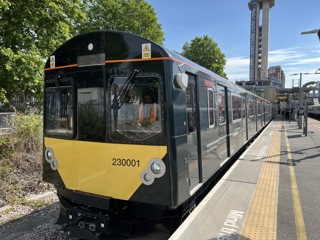
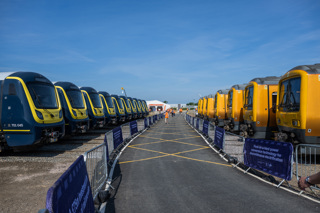
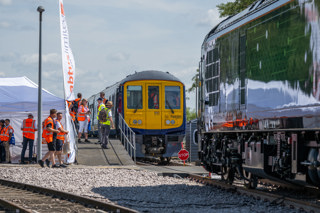
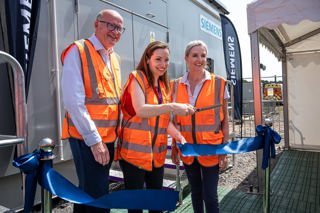
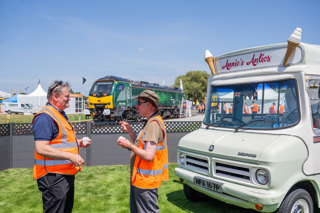











Login to comment
Comments
No comments have been made yet.